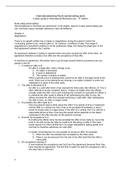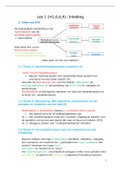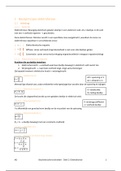Internationalisering Recht samenvatting boek
A basic guide to International Business Law – 5th edition
Korte uitleg samenvatting.
Het lesmateriaal en het boek zijn geschreven in het engels, daarom is deze samenvatting dat
ook. Het boek mag je namelijk meenemen naar het tentamen.
Chapter 2
Negotiations
There is no specific written law or treaty on negotiations during the period in which the
‘contracting parties to be’ conduct talks on, for instance, conditions of sale. This stage of
negotiations is henceforth referred to as the preliminary stage, this being the stage prior to the
final agreement between the 2 parties.
An agreement between 2 parties is reached when one party accepts the offer of the other. An
agreement therefore consists of an offer and the acceptance of that offer.
In reaching an agreement, the parties have to go through several distinct procedures (we use
parties A and B).
1. A makes an offer to B
An offer is a legal offer, when 3 things occur.
1) An object is described
2) A price is determined
3) The number of objects is stated
When a specific price is missing there cannot be an offer in the legal sense of the
word. When one or two elements are missing, a so-called invitation to enter into
negotiations is given to the other party.
2. The offer is delivered to B
An offer is a valid offer when it has reached the other party (the offeree), B. This is
often referred to as the ‘reception theory’. It does not matter when the offeree
actually reads the offer. Up to and including this moment it is possible for offerer A
to withdraw the offer made to offeree B. By withdrawing the offer in time, the
offerer prevents the offer from actually becoming a valid offer. After withdrawing
the offer in time, an offer no longer exists.
3. B considers the offer made by A
How long does B have to think about this offer? If no period of time is mentioned
and the offer is a verbal one, then it has to be accepted immediately or else it
would no longer exist in a legal sense. If the offer is in writing, then it is valid for a
reasonable period of time. How long this period will be depends on the object
mentioned in the offer and also on the persons involved.
4. B sends his acceptance to A
B is letting the offerer know he has accepted the offer A has made up. Up to this
point A can still revoke the offer he made to B. Revoking an offer in this case
would require A to inform B that he is no longer interested in selling goods to B
and that he therefore withdraws his valid offer.
In certain circumstances it is not possible to revoke an offer, for example:
1) When the offer has already been accepted by the other party.
2) When it can be deduced from the text of the offer itself that the offer is
irrevocable.
5. B’s acceptance reaches A
A now receives the acceptance sent by B and the agreement becomes final: they
have reached an agreement. The fact that A might not read B’s acceptance until a
few days later is irrelevant.
1
, 6. Revoking an offer after reaching an agreement
This situation can arise in the period immediately following A’s receipt of the
acceptance. In circumstances where the offer was made with the reservation
‘prices subject to change’ or ‘prices not binding’, it is still possible for A to revoke
his offer after it has been accepted but it must be done so immediately.
What is the legal status of negotiations? A letter of intent is often used to establish the current
status of negotiations between the parties involved. It is also intended to be a draft version of the
final agreement.
Case law (judgements given in courts of law which establish the law for subsequent cases of a
similar nature) has shown that the preliminary stage is governed by the so-called rules of good
faith. These rules govern the preliminary stage and thus place an obligation on both negotiating
parties to take the other party’s interests into consideration. But what does that mean? It means
both parties have to give each other accurate information, and not mislead each other during
negotiations.
The problem of taking the other party’s interest into consideration becomes more relevant when
one party pulls out of negotiations. In a situation where one party has invested more money than
usual to obtain a contract, the withdrawal from negotiations by the other party without
compensating their costs is not appropriate.
Essential to an agreement are agreements on the elements of price and object. If parties have
reached an agreement on these two essentials issues, then there is an agreement. In that case,
a party breaking off ‘negotiations’ is really committing a so-called breach of contract. This party is
therefore, according to the rules of civil law, liable to pay damages to the other party. This liability
consists of compensation for costs covering the amount that is considered reasonable in that line
of business and may also include a loss of profit by the other party.
But what if parties did not agree on price and/or objects? In that case there is no agreement and
no way of getting one’s costs compensated by claiming damages as a result of a breach of
contract. The only option left to the party that suffered damages, is to claim compensation for
these damages based on tort. Using tort makes the above-mentioned legal aspects of
negotiations relevant.
What is a tort and when does one commit a tort when breaking off negotiations?
1. A tort is a wrongful act/civil wrong between two private individuals
2. Either party’s action is wrongful when it can be regarded as conflicting with the rules of
good faith that govern the preliminary stage.
3. Obviously, the party breaking off negotiations failed to take the other party’s interest into
consideration, which is required of both parties when entering into negotiations.
4. Taking the other party’s interest into consideration could men for example paying an
amount of money to compensate for the other party’s costs.
If indeed a tort can be established based on these 4 points, then it may be possible to claim
damages. The damages one party can claim by means of a tort in cases like this depends on the
stage the negotiations where at when the other party broke them off. The preliminary stage
comprises 2 stages:
1. First stage parties start negotiating
2. Second stage agreement is within reach
At the first stage parties are free to break off negotiations. At this stage the costs of busieness
offers, calculations and traveling expenses are at their own expense.
At the second stage negotiations have reached a point where an agreement is within reach.
Neither party is at liberty to break off negotiations but if one does, that party will have to
compensate the other party for the costs incurred.
2
A basic guide to International Business Law – 5th edition
Korte uitleg samenvatting.
Het lesmateriaal en het boek zijn geschreven in het engels, daarom is deze samenvatting dat
ook. Het boek mag je namelijk meenemen naar het tentamen.
Chapter 2
Negotiations
There is no specific written law or treaty on negotiations during the period in which the
‘contracting parties to be’ conduct talks on, for instance, conditions of sale. This stage of
negotiations is henceforth referred to as the preliminary stage, this being the stage prior to the
final agreement between the 2 parties.
An agreement between 2 parties is reached when one party accepts the offer of the other. An
agreement therefore consists of an offer and the acceptance of that offer.
In reaching an agreement, the parties have to go through several distinct procedures (we use
parties A and B).
1. A makes an offer to B
An offer is a legal offer, when 3 things occur.
1) An object is described
2) A price is determined
3) The number of objects is stated
When a specific price is missing there cannot be an offer in the legal sense of the
word. When one or two elements are missing, a so-called invitation to enter into
negotiations is given to the other party.
2. The offer is delivered to B
An offer is a valid offer when it has reached the other party (the offeree), B. This is
often referred to as the ‘reception theory’. It does not matter when the offeree
actually reads the offer. Up to and including this moment it is possible for offerer A
to withdraw the offer made to offeree B. By withdrawing the offer in time, the
offerer prevents the offer from actually becoming a valid offer. After withdrawing
the offer in time, an offer no longer exists.
3. B considers the offer made by A
How long does B have to think about this offer? If no period of time is mentioned
and the offer is a verbal one, then it has to be accepted immediately or else it
would no longer exist in a legal sense. If the offer is in writing, then it is valid for a
reasonable period of time. How long this period will be depends on the object
mentioned in the offer and also on the persons involved.
4. B sends his acceptance to A
B is letting the offerer know he has accepted the offer A has made up. Up to this
point A can still revoke the offer he made to B. Revoking an offer in this case
would require A to inform B that he is no longer interested in selling goods to B
and that he therefore withdraws his valid offer.
In certain circumstances it is not possible to revoke an offer, for example:
1) When the offer has already been accepted by the other party.
2) When it can be deduced from the text of the offer itself that the offer is
irrevocable.
5. B’s acceptance reaches A
A now receives the acceptance sent by B and the agreement becomes final: they
have reached an agreement. The fact that A might not read B’s acceptance until a
few days later is irrelevant.
1
, 6. Revoking an offer after reaching an agreement
This situation can arise in the period immediately following A’s receipt of the
acceptance. In circumstances where the offer was made with the reservation
‘prices subject to change’ or ‘prices not binding’, it is still possible for A to revoke
his offer after it has been accepted but it must be done so immediately.
What is the legal status of negotiations? A letter of intent is often used to establish the current
status of negotiations between the parties involved. It is also intended to be a draft version of the
final agreement.
Case law (judgements given in courts of law which establish the law for subsequent cases of a
similar nature) has shown that the preliminary stage is governed by the so-called rules of good
faith. These rules govern the preliminary stage and thus place an obligation on both negotiating
parties to take the other party’s interests into consideration. But what does that mean? It means
both parties have to give each other accurate information, and not mislead each other during
negotiations.
The problem of taking the other party’s interest into consideration becomes more relevant when
one party pulls out of negotiations. In a situation where one party has invested more money than
usual to obtain a contract, the withdrawal from negotiations by the other party without
compensating their costs is not appropriate.
Essential to an agreement are agreements on the elements of price and object. If parties have
reached an agreement on these two essentials issues, then there is an agreement. In that case,
a party breaking off ‘negotiations’ is really committing a so-called breach of contract. This party is
therefore, according to the rules of civil law, liable to pay damages to the other party. This liability
consists of compensation for costs covering the amount that is considered reasonable in that line
of business and may also include a loss of profit by the other party.
But what if parties did not agree on price and/or objects? In that case there is no agreement and
no way of getting one’s costs compensated by claiming damages as a result of a breach of
contract. The only option left to the party that suffered damages, is to claim compensation for
these damages based on tort. Using tort makes the above-mentioned legal aspects of
negotiations relevant.
What is a tort and when does one commit a tort when breaking off negotiations?
1. A tort is a wrongful act/civil wrong between two private individuals
2. Either party’s action is wrongful when it can be regarded as conflicting with the rules of
good faith that govern the preliminary stage.
3. Obviously, the party breaking off negotiations failed to take the other party’s interest into
consideration, which is required of both parties when entering into negotiations.
4. Taking the other party’s interest into consideration could men for example paying an
amount of money to compensate for the other party’s costs.
If indeed a tort can be established based on these 4 points, then it may be possible to claim
damages. The damages one party can claim by means of a tort in cases like this depends on the
stage the negotiations where at when the other party broke them off. The preliminary stage
comprises 2 stages:
1. First stage parties start negotiating
2. Second stage agreement is within reach
At the first stage parties are free to break off negotiations. At this stage the costs of busieness
offers, calculations and traveling expenses are at their own expense.
At the second stage negotiations have reached a point where an agreement is within reach.
Neither party is at liberty to break off negotiations but if one does, that party will have to
compensate the other party for the costs incurred.
2












